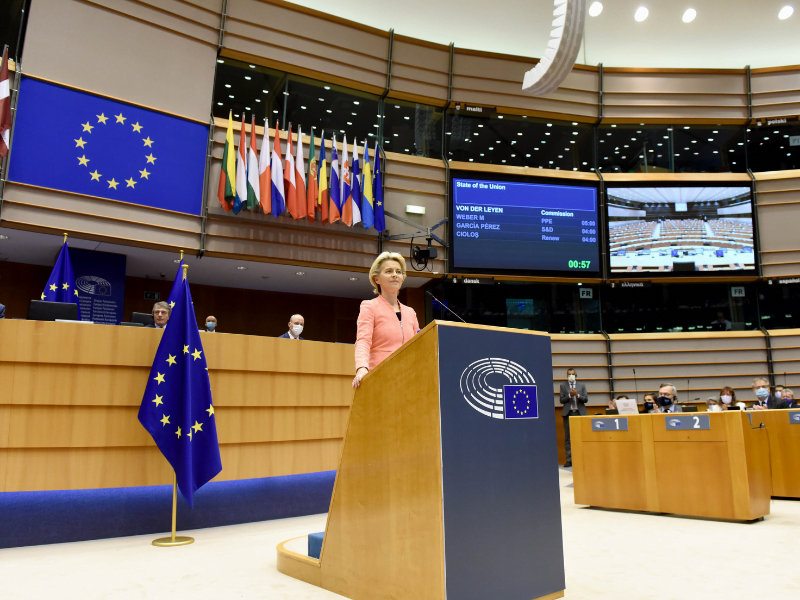On 16 September, President of the European Commission Ursula von der Leyen delivered her State of the Union speech. In it she presented her vision for a renewed and stronger Europe, where Brussels was stepping up its efforts to tackle big crises and challenged EU capitals and international powers to do the same.
The wide-ranging issues touched upon during the speech included reassuring citizens that Brussels now has a firm grip on the pandemic crisis, thanks to a historic budget-and-recovery package and intends to use the momentum created to step up the action on climate change, digital innovation, fighting racism and discrimination, ensuring decent minimum wages, and expanding the power of the EU’s public health agencies.
The rule of law and the sale of passports
The speech continues with a reminder that the Commission attaches the highest importance to the rule of law and that it will ensure that there is no backsliding by Member States and ensuring that money from its budget will be protected against any kind of fraud, corruption and conflict of interest.
Von der Leyen goes on to add that the Commission will continue to defend the primacy of European Law, the freedom of the press and the independence of the judiciary, while breaches in the rule of law will not be tolerated, nor the sale of “golden passports”.
This may appear to be a minor remark in an hour-long speech, but officials have stated that this is something the Commission plans to follow up on by the end of the year with possible infringement procedures against Malta and Cyprus.
Concerns over the cash for passport scheme in Malta were raised from the moment the scheme was proposed by the government in 2013. Despite the government saying Malta’s scheme was the only one approved by the Commission, this had been flatly denied.
A report by the Commission European Commission, in its first assessment of these schemes two years ago, had concluded that the programmes in Malta, Cyprus and Bulgaria had opened Europe to money laundering, tax evasion and organised crime.
As the number of new Maltese citizens who are arrested or investigated increases, Malta’s lack of enforcement in the highly-controversial Individual Investor Programme (IIP) has come under scrutiny by international anti-corruption NGO Global Witness who has repeatedly called for an end to such schemes in EU countries – a call also made by Maltese MEPs David Casa and Roberta Metsola.
The latest appointments to on boards that monitor and evaluate visa, residency and citizenship applications might do little to quell concerns.
Migration
Speaking just a few days after the devastating fire that destroyed the Moria refugee camp on the Greek island of Lesvos, von der Leyen said the EU would support Greece in building a new reception and processing centre for asylum seekers and would try to play a bigger role in managing asylum cases.
Acknowledging that migration remains one of the bloc’s thorniest issues causing deep divisions between States, she added there is still a lot of work to be done and that “saving lives at sea is not optional”.
In the speech, von der Leyen offered few details on the new migration and asylum proposal which will be presented on 23 September, a day before the European Council convenes in Brussels. In a question-and-answer session afterwards, she said the Commission aims to replace the existing procedure on asylum claims known as the Dublin regulation with a “new European migration governance system”.
As it currently stands, the regulation favours the so-called “first entry” criterion, according to which hosting and evaluating each request for international protection is the responsibility of the country through which the asylum seeker entered the EU. These are often Italy, Greece, Spain and to a lesser extent, Malta.
Under the current system, asylum seekers are forced to stay for months, even years in border countries waiting for their application to be examined, without the possibility of travelling to reach relatives, to access a more suitable labour market or to commence a path towards integration.
Given the notorious hostility of Eastern European countries that resulted in repeated vetoes on any compromise that envisaged the relocation of asylum seekers, it is unlikely that this proposal will be met with universal approval, but von der Leyen made her expectations known:
“I want to be clear,” she said. “If we step up, then I expect all Member States to step up too. Migration is a European challenge and all of Europe must do its part.”
Racism, hate, equality
Before the concluding remarks, von der Leyen addressed the systemic discrimination that has become so pervasive around the globe, including in Europe.
She stressed that to build a truly anti-racist Union condemnation is no longer enough, that concrete actions are now required, and that the Commission will put forward a plan to make that happen.
Part of the plan will include a proposal to extend the list of EU crimes to all forms of hate crime and hate speech – whether because of race, religion, gender or sexuality.
It will also strive to strengthen the EU’s racial equality laws where there are gaps and, most notably, the Commission’s first-ever anti-racism coordinator will be appointed, with responsibility not just to maintain anti-racism on the top of the Commission’s agenda but also to work directly with people, institutions and civil society.
The Commission also plans to put forward a strategy to strengthen LGBTQI+ rights.
A full transcript of the speech can be found here.













